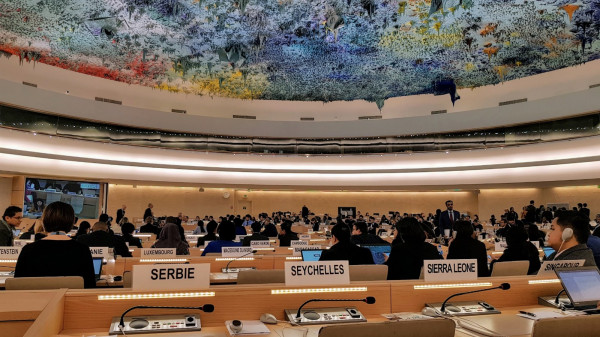47th regular session of the Human Rights Council
Annual full-day discussion on the human rights of women – Gender-equal socioeconomic recovery from the COVID-19 pandemic (second panel)

Oral Statement
Thank you Madam President.
This statement is submitted on behalf of CHOICE for Youth and Sexuality and Beyond Beijing Committee Nepal.
The pandemic has had a significant impact on and hindered access to young people’s SRHR. Lockdowns and economic disruptions have increased cases[1] of sexual and gender-based violence, adolescent unwanted pregnancies[2], harmful traditional practices and maternal mortality. Without access to their SRHR, young people are further at risk of experiencing gender inequality, and we are further from achieving a gender-equal socioeconomic recovery from this pandemic.
In Nepal, due to the pandemic, maternal mortality has increased drastically; many young people were unable to access information and services regarding their SRHR, and the antenatal and postnatal visits by pregnant women were halted due to no public transportation. At least 32 women have died due to birth complications in the first lockdown, almost a 200% increase in the maternal mortality ratio. Likewise, sexual and gender-based violence increased drastically, with violence against young women and girls being among the highest numbers recorded. There can be no gender-equal recovery while so many young people are denied their SRHR and are at an increased risk of maternal mortality and sexual and gender based violence.
We call on states to ensure that SRHR is strengthened and protected, and to meaningfully include youth in the development and implementation of pandemic recovery. Thank you.
Full written statement
Thank you Madam President.
We are pleased to have the floor during this important panel on the gender-equal socioeconomic recovery from the COVID-19 pandemic. This statement is submitted on behalf of CHOICE for Youth and Sexuality, Rutgers, Arrow, and Beyond Beijing Committee Nepal.
The coronavirus pandemic has had a significant impact on and hindered access to young people’s sexual and reproductive health and rights. Moreover, lockdowns, and economic and infrastructural disruptions have increased cases of sexual and gender-based violence, adolescent unwanted pregnancies, harmful traditional practices (such as child marriage and female genital mutilation and cutting) and maternal mortality. Without access to their Sexual and Reproductive Health and Rights, young people are further at risk of experiencing gender inequality, and we are further from achieving a gender-equal socioeconomic recovery from this pandemic.
Interruption of schooling has cut-off young people from important sources for information including comprehensive sexuality education. Deep impacts on mental health and wellbeing were experienced, some youth turning to risky behaviour. Many young people lost their source of income. This has also lead to increased recourse to transactional sex, contributing to additional risks for young people’s sexual and reproductive health. Moreover, the digital gender divide is another challenge, particularly for young rural girls, in accessing digital schooling, gaining less benefit than young boys.
Due to the pandemic, 47 million women and girls are estimated to have been pushed below the poverty line. This is not an issue only for women and girls, but for people across all genders. In poverty, access to menstruation products is restricted, limiting access to school and society for people with periods. In poverty, domestic work falls in majority to young women and girls, and prevents them from receiving an education due to domestic duties. In poverty, the vicious cycle of gender inequality does not break, but is exacerbated.
Without access to adequate Sexual and Reproductive Health and Rights, there can be no gender-equal socioeconomic recovery. Access to comprehensive sexuality education benefits all young people and adolescents with knowledge of safe sex, preventing unwanted pregnancies, consent and more. Access to Sexual and Reproductive Health services ensures gender-equal pandemic recovery by enabling young people to make safe and healthy choices, thereby preventing unwanted pregnancies, STI's and sexual and gender based violence. Education and health are vital for a gender-equal socioeconomic recovery from this pandemic.
In Nepal, due to the pandemic the maternal mortality rate has increased drastically, due to According to the National Women Commission, during the first lockdown in 2020, they received 1361 calls regarding domestic violence. Among the total calls, 77% are reported regarding domestic violence, and 33% reported regarding violence against women. Before the lockdown, the recorded case of violence against women was 12% which has been drastically increased to 23%, which means an increase of 11%. Before the lockdown, the recorded cases of sexual violence against women was 7% which has been increased to 9% since the lockdown. Women and girls of 26-40 year were affected the most with 44%, followed by young people age group 16-25 with 35% since the lockdown. Due to the restriction and lockdown, many women and girls were unable to access information and services regarding their SRHR, and the antenatal and postnatal visits by pregnant women were halted due to no public transportation. The postnasal visit programme in the new mother’s home by a trained nurse was unable to continue, resulting in a drastic increase in maternal mortality. At least 32 women have died due to related birth complications in the last two months of lockdown. This is an almost 200% increase in the maternal mortality ratio.
We call on states to ensure;
- That sexual and reproductive health and rights are not rolled back, but are strengthened, for the protection and enjoyment of every young person.
- Meaningfully include youth- and girl- led organisations and individuals in the development and implementation of pandemic recovery
- Ensure youth- and girl- led initiatives and organisations receive funding to address SRHR issues exacerbated by the coronavirus pandemic.
[1] https://reliefweb.int/report/world/studies-show-severe-toll-covid-19-sexual-and-reproductive-health-rights-around-world
[2] https://www.unfpa.org/news/one-year-pandemic-unfpa-estimates-12-million-women-have-seen-contraceptive-interruptions




 Previous News article
Previous News article